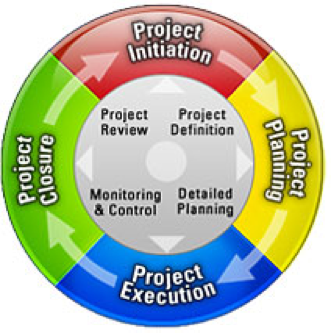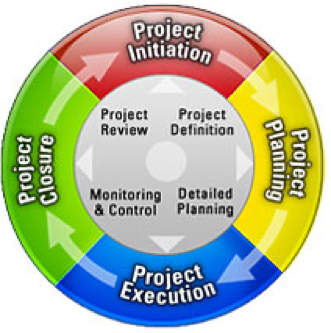Skills and knowledge for successful project planning: A College and Career Readiness Standards for learners at Grade Level D.
Part 1: Lesson Description
Lesson Title
Skills and knowledge for successful project planning: A College and Career Readiness Standards for learners at Grade Level D.
Abstract
Project planning and delivery is a crucial skill for academic studies as well as the world of work. By participating in this course, adult learners will develop the necessary project planning skills and knowledge to prepare them for continued study and gain specific employability skills- communication and project planning. This lesson will help prepare learners to effectively plan and deliver a project. The lesson aims to teach the terms, concepts and communication skills of effective project planning including the project life cycle, project charter and work breakdown schedule. It is an interactive and informative course, designed to build on learners’ own previous experience and real world examples.
The intended audience are adult learners at grade level D with low literacy and numeracy skills. It is aimed at students studying in the adult education sector, who are studying alongside other commitments, for example family or work. The project planning terms and concepts are taught in an accessible, informal way, connecting to previous knowledge and understanding. Participants will participate in a range of conversations and collaborations with others partners, building on ideas and expressing their own clearly and persuasively. Conversations may be one-to-one, in groups or teacher-led. Learners will develop and demonstrate a variety of communication skills, including posing questions that connect the ideas of speakers, responding to questions and comments, acknowledging information expressed by others and when required, qualifying their own views.
The lesson materials and resources will enable the lesson to taught in a variety of contexts and environment, with minimal access to the internet and other technical resources.
Learner Audience / Primary Users
This lesson
is aimed at adult learner at grade level D with low numeracy and literacy
skills. It is aimed at the adult education sector, where students are studying
alongside other commitments. It is aimed at adult learners with a variety of life
experience and knowledge and access to varied resources, such as the Internet.
Primary
user:
- Teacher
- Student
This course can be used by teachers in a wide variety of adult learning contexts.
Educational Use
● Curriculum / Instruction ● Professional development ● Information Education ● Career and College Readiness ● Employability skills.
Language
English
Material Type
● Instructional Material ● Interactive and stimulations ● Lesson Plans and worksheets ● Homework and Assignments
Keywords
● Designers for Learning ● Adult Education ● Project planning cycle ● Project Management ● Communication skills ● Collaboration ● Employability skills ● Career and College Readiness
Time Required for Lesson
45-minute lesson plus Home Practice (15-30minutes).
Targeted Skills
Key skills covered in this lesson include: ● Speaking ● Writing ● Business and Communication ● Employability ● Project Management ● Project planning ● Career Readiness
Learning Objectives
By the end of this lesson, the learner should be able to:
● Cite and describe key project management terms and concepts including the project planning lifecycle.
● Employ this knowledge and skills to planning real-world projects and creating a Project Charter.
● Demonstrate key skills for effective communication and collaboration within the class.
College & Career Readiness Standards (CCRS) Alignment
● Level: Adult Education ● Grade Level: D ● Subject: English Language ● Domain or Strand: Language – Speaking and listening, Reading and Writing ● Sub-strand: Scientific and Technical text ●
Standard Description: CCR Anchor 1: Prepare for and participate effectively in a range of conversations and collaborations with diverse partners, building on others’ ideas and expressing their own clearly and persuasively.
Prior Knowledge
The course is aimed at students at grade level D. No prior knowledge is required of project management or planning.
Required Resources
1. Terms and concept sheet
2. PowerPoint/flip chart/blackboard/Sticky
notes/Flipchart Pens
3. Presentation slides for lesson
4. Project planning video
5. Project Charter handout - blank copies and example copies
6. Key terms glossary evaluation
Lesson Author & License
● Lesson Author: Laura Epton
● License: Creative Commons CC BY 4.0 license 9.
Part 2: Lesson
1. Warm-up
Time: 10 minutes
Group discussion sharing experiences of previous projects.
Activity guidance:
- Instigate a class discussion and engagement by asking learners to share experiences of projects they have worked on (in any role).
- Write projects on the board.
Throughout ask questions to assess prior knowledge of the material being covered in the class: watch for any terms or processes they use or describe.
2. Introduction and Learning Objectives
Time: 10 minutes
Activity guidance.
- Teacher to present the learning objectives of the lesson and give an overview of the content of the lesson
- Show a short YouTube video clip called Planning a project in 5 Steps from ProjectManagement.com. Be aware that the class may feel intimidated by video so you should judge whether it is appropriate. An alternative is provided in the supplementary resources.
Project Planning Process: 5 Steps To Project Management Planning
5. Class discussion about how planning is beneficial– to focus the learners’ attention on the lesson. If time, ask the class to write ideas on sticky notes and place on the board.
Reasons may fall under these headings: Give direction, allocate responsibility, adequate resources, problem anticipation, skills needed, reliability, project completion and learning.
3. Presentation and Demonstration of Project Management Life Cycle and Project Charter
Time: 10 minutes
Presentation of Project Life Cycle and Demonstration of Project Charter using an example project relevant to the student’s real life.
Activity guidance:

Image of Project Life Cycle from Wikipedia Commons
- Ask students to define the term ‘project’.
- Talk through the Project Management Life Cycle (from Wikipedia, the free Encyclopedia)
- Explain that we will focus one element of the cycle – the project planning using a project charter.
- Distribute the Project Charter worksheet and then provide a verbal demonstration of key terms and concepts using a real world example. Ask questions to engage the class in contributing to its production.
- As learners to work through the glossary linking the terms with it's meaning. There are 2 ways to deliver this activity: a. individuals work on this independently drawing a line between the terms and definitions, b. print off the terms and definitions in large writing and distribute these in the class. Then ask learners to read out the term at the front of the class- and the class then picks the definition collaboratively. Each task should help cement the words in their vocabulary.
4. Guided Practice
Time: 15 Minutes Learners work in pairs to develop a class project charter.
Activity guidance:
- Explain the class together is going to produce a project charter for a shared project. Suggested example is the promotion of Easter Eggs in a store
- Learners to form pairs or small groups
of three. The pairs/groups will complete an assigned section – if they complete
their section then they can turn to other sections of the project charter. Each
learner needs a Project Charter handout. Walk around
the room to monitor progress and discussions within pairs/groups.
5. Evaluation
Time: 10 minutes
Learners provide verbal feedback to demonstrate whether they can perform the skill just practiced.
Activity guidance:
- Each pair provides an informal presentation on their project charter. After feedback ask class members to provide other ideas or comments to help individual learners and the class to reflect on their learning, correct misunderstandings or reinforce learning.
6. Application
Time: Home practice – 30mins
Learners select a project of their choice and create a Project Charter for it independently.
Activity guidance:
- Independently produce a Project Charter for a real-world project of the learners’ choosing. Through this activity, learners will have an opportunity to apply the learning beyond the lesson and connect to their own lives.
Key Terms and Concepts
Key Terms and Concepts achievement of learning objectives and for those without previous knowledge of the topic:
● Project ● Project planning cycle ● Project charter ● Initiation ● Planning ● Execution ● Closure ● Task
Part 3: Supplementary Resources & References
Supplementary Resources
Alexander, M. 2016, Planning is key to project management success, CIO Digital Magazine, Online, Palmetto Document Systems, Inc. Retrieved from http://www.cio.com/article/2932987/project-management/planning-is-key-to-project-management-success.html
Better Business Learning, 2014, What is Project Management? Training Video, Online. Retrieved from https://www.youtube.com/watch?v=9LSnINglkQA
The Open University, 2016, Planning a Project, Online, OpenLearn. Retrieved from http://www.oercommons.org/courses/planning-a-project/view
Wikipedia, 2016, Glossary of Project Management Terms, Online. Retrieved from https://en.wikipedia.org/wiki/Glossary_of_project_management#)
References
Walsh, I. A, 2014, Project Management Lifecycle, image/jpg, Wikimedia Commons, November 2016. Retrieved from https://commons.wikimedia.org/wiki/File:Project_Management_Lifecycle.jpg)
Wikipedia, 2016, Project, Online, Wikimedia Commons, November 2016. Retrieved from https://en.wikipedia.org/wiki/Project
Project Management Videos, 2013, Project Planning Process: 5 Steps To Project Management Planning, Online, Projectmanagement.com. Retrieved from https://www.youtube.com/watch?v=Do8iykQKMfU
Attribution Statements
Definitions and project management life cycle diagram on which elements of the lesson are based on content from Wikipedia, online encyclopedia.

This is an image of the Project Life Cycle, from Wikipedia Commons